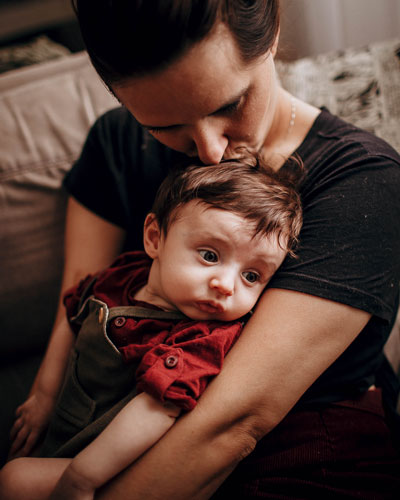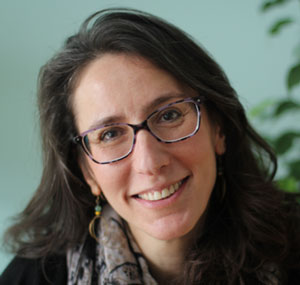The Holding Space: A group for moms to build emotional resilience
 The Holding Space is a 12-week group therapy for
moms with postpartum anxiety and depression. We
strive to offer a space of hope and healing where
mothers’ feelings can be held with compassion,
acceptance, and non-judgment. Designed by a
psychiatrist and a psychologist with decades of
experience treating mothers with anxiety and
depression, the group helps participants learn to:
The Holding Space is a 12-week group therapy for
moms with postpartum anxiety and depression. We
strive to offer a space of hope and healing where
mothers’ feelings can be held with compassion,
acceptance, and non-judgment. Designed by a
psychiatrist and a psychologist with decades of
experience treating mothers with anxiety and
depression, the group helps participants learn to:
- Reduce anxiety
- Decrease self-criticism
- Manage emotional triggers
- Increase
self-acceptance
- Be more present with themselves
and their kids
2021 - 2022 groups will be held online via zoom
with two group leaders (either Dr. Pollack or Dr.
Broudy and a therapist co-leader). Group sessions
will be once a week for 90 minutes for 12 weeks.
The Holding Space is part of a pilot study
project led by Deborah Pollack, Ph.D., Assistant
Professor of Psychology at Utica College. The study
is supported by a grant from the American
Psychological Foundation.
Participants will be asked to complete several
brief interviews and questionnaires, all online, so
that we can study the effectiveness of the group.
To participate in the group you must:
- Be 18+ years old
- Have current symptoms of anxiety and/or depression that started or worsened within one year postpartum
- Have one or more children under 5 years old
- Have internet access to participate in online group sessions
- Further eligibility will be determined over a screening interview
We encourage and welcome inquiries from individuals who identify as Black, Indigenous, and people of color; identify as LGBTQIA+, and/or from marginalized or under-represented populations.
Please contact us below for further information! New groups are forming now
Intensive Short-Term Dynamic Psychotherapy (ISTDP) for Postpartum Anxiety and Depression
In the current study, we are looking at whether a 6-month course of ISTDP can effectively treat postpartum depression and anxiety, and promote other benefits, such as improving the mother’s experience of mothering and reducing her risk of relapsing.
Participants will be asked to complete several brief interviews and questionnaires, all online, so that we can study the effectiveness of the treatment.
To participate in this study you must:
- Be 18+ years old
- Have current symptoms of anxiety and/or depression that started or worsened within one year postpartum
- Have a child under the age of 3
We encourage and welcome inquiries from individuals who identify as Black, Indigenous, and people of color; identify as LGBTQIA+, and/or from marginalized or under-represented populations.
Please contact us below for further information! This study is currently underway.
What is ISTDP?
Intensive Short-Term Psychotherapy, or ISTDP, is a psychotherapy approach that can offer rapid relief from psychological and emotional suffering. This method was developed beginning in the 1970s by Dr. Habib Davanloo, who studied thousands of video recorded psychotherapy sessions to understand which techniques in psychotherapy bring about the most rapid and profound change. Combining these techniques, he developed ISTDP, which has now been proven to be effective in numerous studies and for multiple conditions
In ISTDP, the therapist takes an active, engaged stance to help the client identify their goals as well as the protective mechanisms that prevent them from meeting these goals. Trauma and other challenging childhood experiences can lead us to develop mechanisms that help protect us in childhood, but later in life, can lead to symptoms of depression and anxiety, and keep us stuck in unhealthy patterns.
ISTDP uses powerful techniques to help clients build the capacity to regulate their anxiety so they can relinquish their old protective mechanisms and tolerate their underlying emotions. As clients experience these often previously unconscious emotions, they begin to feel less depressed and anxious, more authentically connected to themselves and more intimately connected to others.
 Raising children can be one of the most joyous parts of life, but it’s also filled with many challenges. Our kids evoke complex and powerful feelings in us, often right in the moment when we need to act fast to figure out how to respond. Parenting books and classes give helpful strategies, but strong emotions can cloud our judgment and our abilities to put those strategies into practice. This is why we believe that many parents can benefit from therapy designed to help them work through and better manage their feelings.
Raising children can be one of the most joyous parts of life, but it’s also filled with many challenges. Our kids evoke complex and powerful feelings in us, often right in the moment when we need to act fast to figure out how to respond. Parenting books and classes give helpful strategies, but strong emotions can cloud our judgment and our abilities to put those strategies into practice. This is why we believe that many parents can benefit from therapy designed to help them work through and better manage their feelings. Carolyn Broudy, MD, MS
Carolyn Broudy, MD, MS Deborah L. Pollack, Ph.D.
Deborah L. Pollack, Ph.D. The Holding Space is a 12-week group therapy for
moms with postpartum anxiety and depression. We
strive to offer a space of hope and healing where
mothers’ feelings can be held with compassion,
acceptance, and non-judgment. Designed by a
psychiatrist and a psychologist with decades of
experience treating mothers with anxiety and
depression, the group helps participants learn to:
The Holding Space is a 12-week group therapy for
moms with postpartum anxiety and depression. We
strive to offer a space of hope and healing where
mothers’ feelings can be held with compassion,
acceptance, and non-judgment. Designed by a
psychiatrist and a psychologist with decades of
experience treating mothers with anxiety and
depression, the group helps participants learn to: